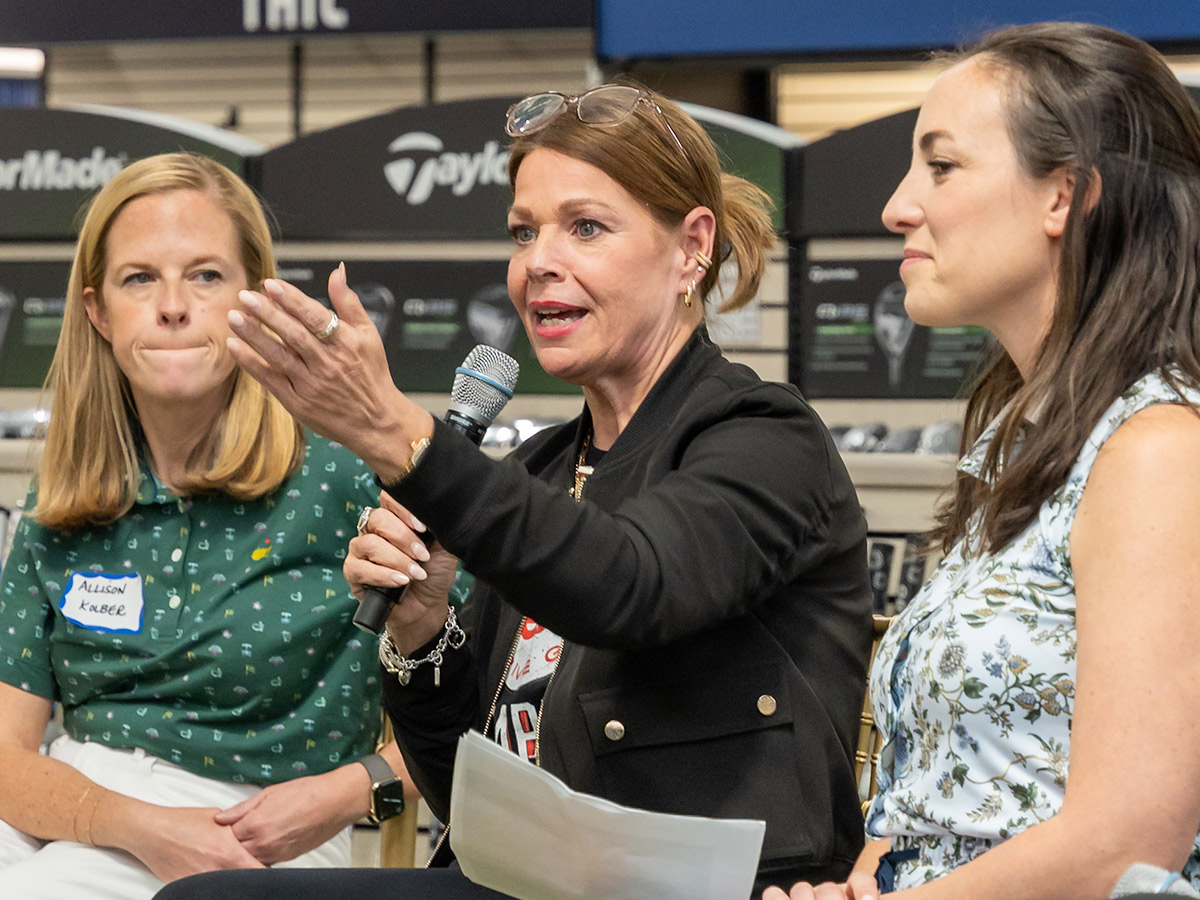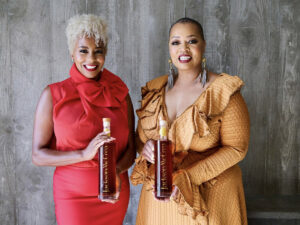When was the last time you saw golf as a game-changer—for your career, your confidence, or your community? That’s exactly what Jill Thomas is redefining. As the Chief Marketing and Customer Experience Officer for PGA TOUR Superstore, she’s leading the charge in transforming golf from an exclusive club for men into a welcoming, culture-forward space where everyone belongs.
Before bringing her marketing magic to the world of fairways and drivers, Thomas made waves in some of the most iconic brand environments. She honed her strategic and emotional brand instincts early in her career at Publix, where she worked closely with legendary leaders and began to understand the power of experience-led business. After earning her MBA as a working single mom, she went on to spend nearly 15 years at The Walt Disney Company, where she led initiatives across theme parks, vacation clubs, and corporate alliances.
She later took that “every-touchpoint-matters” ethos to Cinnabon, where she helped reposition the brand into something far more meaningful than a mall food court staple. Then, at Pepsico, she brought purpose-driven thinking to a fast-moving consumer space—laying the foundation for what would ultimately become a new frontier: golf as lifestyle, culture, and inclusive community.
We sat down with Thomas to talk about her journey, her marketing philosophy, and how she’s using data, storytelling, and culture to reimagine what golf can be—for women, for younger players, and for every kind of fan.
“Golf isn’t just about perfect swings and strict rules anymore,” she explains. “It’s about building connections, finding community, and having fun while you learn.”
Jill Thomas, the Chief Marketing and
Customer Experience Officer for the PGA TOUR Superstore

You’ve had such a fascinating journey into marketing. Can you take us back to your early days at Publix and how that experience, plus getting your MBA, shaped the leader you are today?
Jill Thomas: My journey into marketing wasn’t traditional, and honestly, I didn’t even know what “marketing” really meant at first. I was working at Publix—where my father was the personal pilot for George Jenkins, the founder—and I had this unique front-row seat to customer experience before I even knew to call it that. My dad always thought about details, like what someone wanted to drink or how they were greeted. That stuck with me.
During college summers, I worked at Publix in various departments—real estate, quality assurance—but the turning point came when I spent a summer with their longtime chief marketing officer. He told me I could answer phones, or I could come to every meeting and learn everything. I chose the second option, and it changed my life. He became a lifelong mentor.
Later, as a single mom with two young kids, I decided to get my MBA at the University of Florida through a weekend program. I couldn’t go off to Kellogg or Wharton—I had to stay close. But I stand by that decision 100%. It was the best education I could’ve asked for in my universe at that time. I paid for it myself, worked full-time, and juggled a lot. That experience taught me resilience, discipline, and the importance of creating your own path, even when the system isn’t built with you in mind.
What lessons from your time at Disney still influence how you think about customer experience?
Jill Thomas: I spent nearly 15 years at Disney, and you can’t live in that culture without carrying it with you. Disney taught me that every brand touchpoint matters. It’s not just about selling a product—it’s about crafting a meaningful, differentiated experience.
That ethos shaped how I approached roles at Cinnabon, Pepsico, and now PGA TOUR Superstore. At Disney, we didn’t sell tickets—we sold magic. That level of intentionality is something I strive to bring into every brand I work with.
What’s your leadership philosophy when building high-performing teams?
Jill Thomas: I talk about something I call radical interdependence. At Disney, I learned that cross-functional synergy isn’t a bonus—it’s a requirement. Marketing can’t just be off in its own lane. We all have to see the whole picture—how merchandising, operations, and brand come together. That’s how you create cohesive, impactful customer experiences. It’s not just about being efficient—it’s about being aligned.
How do you translate that “magic” into a brand like Cinnabon or a golf retailer?
Jill Thomas: At Cinnabon, I repositioned the brand from “selling cinnamon rolls in a mall” to “delivering a moment of respite in a crazy world.”
It was about tapping into the emotional connection that smell and memory evoke. With PGA TOUR Superstore, it’s similar—golf is not just a sport, it’s a lifestyle, a passion. Our marketing has to reflect that, whether it’s for the seasoned golfer or someone just getting started.
How are you using data to create a more personalized customer experience?
Jill Thomas: Personalization at scale is incredibly hard—but we’ve invested in it for five years. I brought in a Director of Data Science to sit within marketing, not IT, because data is core to everything we do—from loyalty to CRM to how we speak to different customer segments.
Our goal isn’t batch-and-blast—it’s relevance. And AI has really accelerated our ability to target, learn, and adapt in real time.
Let’s talk fan culture. How do you build that level of engagement around a golf retail brand?
Jill Thomas: Fan culture starts with understanding your audience deeply, not superficially. At PGA TOUR Superstore, we use data and behavioral cues to identify what our customers care about. Social media has been a huge lever. We focus on organic content that speaks to lifestyle and authenticity, not just product. We align with creators who represent the “modern voice” of golf. It’s not about pushing product; it’s about showing up in culture, in conversation, and staying true to your brand voice.
What does “mainstreaming” golf look like to you?
Jill Thomas: My dream is to see one of our women-led golf spots run on Bravo. Not Golf Channel—Bravo. That would mean we’ve arrived. That we’re not just selling product, we’re part of culture. We’re no longer just talking to the traditionalist—we’re inviting the lifestyle golfer, the social golfer, the curious beginner. That’s how golf becomes part of the larger conversation.
You mentioned social media and influencers. Can you elaborate on how that’s shifted your marketing strategy?
Jill Thomas: Social used to be an afterthought. Now it’s a primary driver of our brand voice and engagement. We’ve empowered our team to create content that resonates culturally—content that they would actually want to see. For our traditional audience, we use more classic channels like the Golf Channel.
But for younger, lifestyle-focused golfers, social is where the culture lives.
Have you seen measurable business results from that approach?
Jill Thomas: Absolutely. Our engagement metrics are off the charts. We’ve seen major golf brands lean on us for digital strategy and content production. And what’s really exciting is that we’re building something no other golf retailer is doing: helping shape culture and giving creators a platform. Some of today’s biggest golf influencers started with us.
What’s been your biggest challenge stepping into your role at PGA TOUR Superstore?
Jill Thomas: Helping the organization see that there’s more than one customer. Traditionally, it was all about the avid male golfer—older, affluent, retired.
But today’s golfer is diverse. They might play 15 holes, wear joggers, or bring their kids. Getting everyone to understand that we must serve all those customers, not just the traditionalists, has been both the hardest and most rewarding part of the job.
What’s your approach to brand storytelling when entering a male-dominated industry?
Jill Thomas: I take inspiration from my time at Publix and Disney—places that understood emotional resonance. In golf, I’ve had to do things I thought were behind me—advocate for inclusion, remind people that women belong in these rooms. But we’ve made progress.
Today, I see female engineers and marketers leading product development in golf. We’re not just talking about inclusion—we’re seeing it manifest.
You have a background in both retail and hospitality. How has that blended into your work in marketing?
Jill Thomas: It’s all experience-led. Whether you’re selling a cinnamon roll or fitting someone for clubs, it’s about how they feel when they interact with your brand. My father, who was a corporate pilot, taught me early on about anticipating needs and creating thoughtful experiences. That stuck with me. Marketing isn’t just messaging—it’s operational empathy. You need to understand the entire customer journey.
You’ve built a data-driven marketing organization. What role does data play in personalization?
Jill Thomas: Everything. We don’t guess—we listen. Through POS data, CRM, and behavioral analysis, we personalize outreach and understand our audience’s intent. We’ve invested in tools that allow us to personalize at scale. It’s not perfect yet, but we’re getting smarter every day. AI is helping us accelerate that—especially in segmentation, creative automation, and audience development.
Let’s talk about Real Housewives for a second—you mentioned being a superfan. Why do you think those shows resonate so strongly with women?
Jill Thomas: Oh, I’ve watched every episode of every franchise. For high-performing women, reality TV can be an escape. After working 24/7, I don’t want to come home and watch the news—I want to unplug. But I do think the tone has changed over the years. What used to be fun and lighthearted has become more toxic. Still, there’s something about seeing women navigate relationships, success, and identity that hits home for a lot of us.
Do you think there’s a deeper opportunity to connect golf to lifestyle and pop culture?
Jill Thomas: Yes—and that’s the future. We’ve pitched collaborations with Bravo personalities and culturally relevant figures. Some traditionalists scoffed, but I reminded them: marketing isn’t about what you like. It’s about the right message to the right audience at the right time. We’re building for the next generation of golfers—people who see golf as stylish, social, and inclusive.
What’s next for you and PGA TOUR Superstore?
Jill Thomas: We’re leaning into retail media and monetizing our data. That’s our next big unlock. We’re also developing an app—not for e-commerce, but for customer experience. It will be functional, intelligent, and totally customer-led. I believe marketing’s role is to be the voice of the customer inside the organization. And now that we’ve built the foundation, I’m excited about what we can do next.
Emily Sprinkle, also known as Emma Loggins, is a designer, marketer, blogger, and speaker. She is the Editor-In-Chief for Women's Business Daily where she pulls from her experience as the CEO and Director of Strategy for Excite Creative Studios, where she specializes in web development, UI/UX design, social media marketing, and overall strategy for her clients.
Emily has also written for CNN, Autotrader, The Guardian, and is also the Editor-In-Chief for the geek lifestyle site FanBolt.com
- Emma Loggins Sprinklehttps://www.womensbusinessdaily.com/author/emma-loggins/
- Emma Loggins Sprinklehttps://www.womensbusinessdaily.com/author/emma-loggins/
- Emma Loggins Sprinklehttps://www.womensbusinessdaily.com/author/emma-loggins/
- Emma Loggins Sprinklehttps://www.womensbusinessdaily.com/author/emma-loggins/







